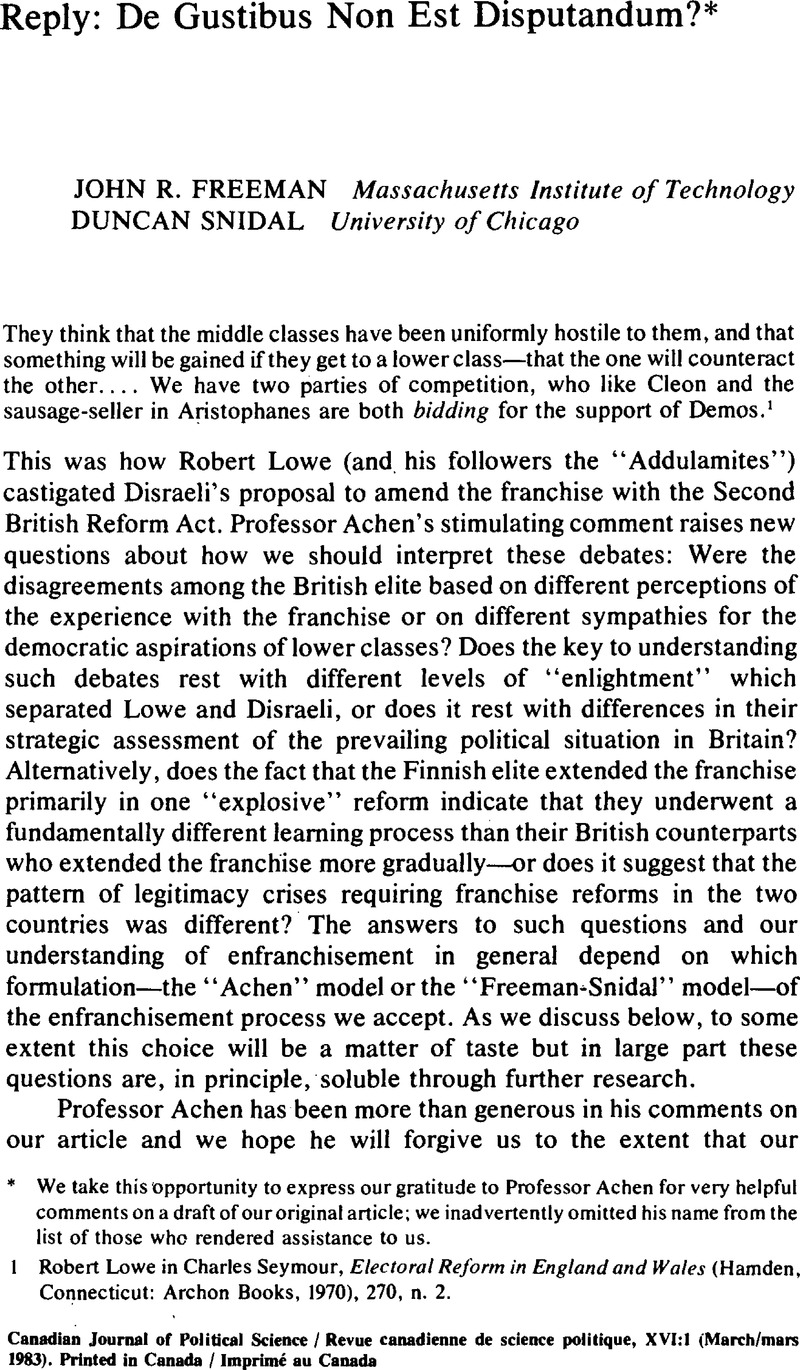Published online by Cambridge University Press: 10 November 2009

1 Lowe, Robert in Seymour, Charles, Electoral Reform in England and Wales (Hamden,Connecticut: Archon Books, 1970), 270, n. 2.Google Scholar
2 To some extent this is true of the Freeman-Snidal model as well. Like the parent whose child keeps asking ‘ why?’ until at some point the response can only be ‘because,’ all explanations must ultimately rest on primitive first-order assumptions. However, the further we can push the explanation in terms of plausible answers to such questions, the more satisfied we will be with it. Thus, it may be a matter of taste, but we feel that our “causal story’ about enfranchisement with its emphasis on the increasing need for legitimacy associated with nation-building and the development and diffusion of democratic expectations is more compelling. It also rests within a well established theoretical tradition which views suffrage extensions as one form of class compromise
3 We would like to clear up a possible misunderstanding of our model which Achen raises. His discussion of our use of the ‘competitive market analogy’ is a reasonable but misleading interpretation of our argument. The fault is ours since we do use terminology which makes it appear as if we are relying on an inappropriate and crude analogy to the theory of competitive markets. Although we overuse terms like “supply” and ‘ demand’ there is in fact nothing in the model that involves treating masses or elites as consumers or firms—or, worst of all, that treats the issue of enfranchisement on a par with getting cabbages or cauliflowers to market! We do assume that both masses and elites behave in a nonstrategic way. For masses this can be understood in terms of their collective action problem in co-ordinating more sophisticated and less reflexive responses to elite decision; for elites the justification rests in their exogenously determined need for legitimacy at the time of any franchise reform. As we discussed above, these assumptions can be challenged but we believe they do not falter on inappropriate analogies to economic theories.
4 Achen's model could be considerably enriched by making the process of learning endogenous so that what elites learn depends directly on their experience with the franchise. For example, elites might be assumed to interpret mass unrest as a sign of the dangers of expanding the suffrage which would lead them to resist further expansions of (and possibly even contract) the franchise. This would make the difference in the predictions of the two models even greater.
5 Rokkan, Stein, Citizens, Elections, Parties: Approaches to the Comparative Study of the Processes of Development (New York: McKay, 1970).Google Scholar
6 We are in full agreement with Professor Achen that the clarity of the mathematical formulation greatly facilitates comparison of both the reasonableness of the two models' assumptions and the accuracy of their predictions. Achen has nicely illustrated how mathematical theorizing allows us to reject some traditional views about the process of enfranchisement such as the proposition that elites progressively learn to accept the lower classes. Of course, this could be done in terms of purely verbal derivations but, as Achen puts it, ‘neither the initial errors nor their corrections are [as] likely to be discovered’ from purely verbal theory. This is because mathematical theories usually are much more explicit about the assumptions being made and the logic through which implications are derived. This is not to denegrate verbal theory. Both Achen and ourselves are heavily indebted to the theoretical insights of Bendix, Niebuhr and Rokkan, among others. Our point is simply that the mathematical character of our models is valuable in allowing clarifying refinements of the arguments, in facilitating the derivation of precise implications of alternate assumptions and, ultimately, in providing criteria for choosing among competing views.